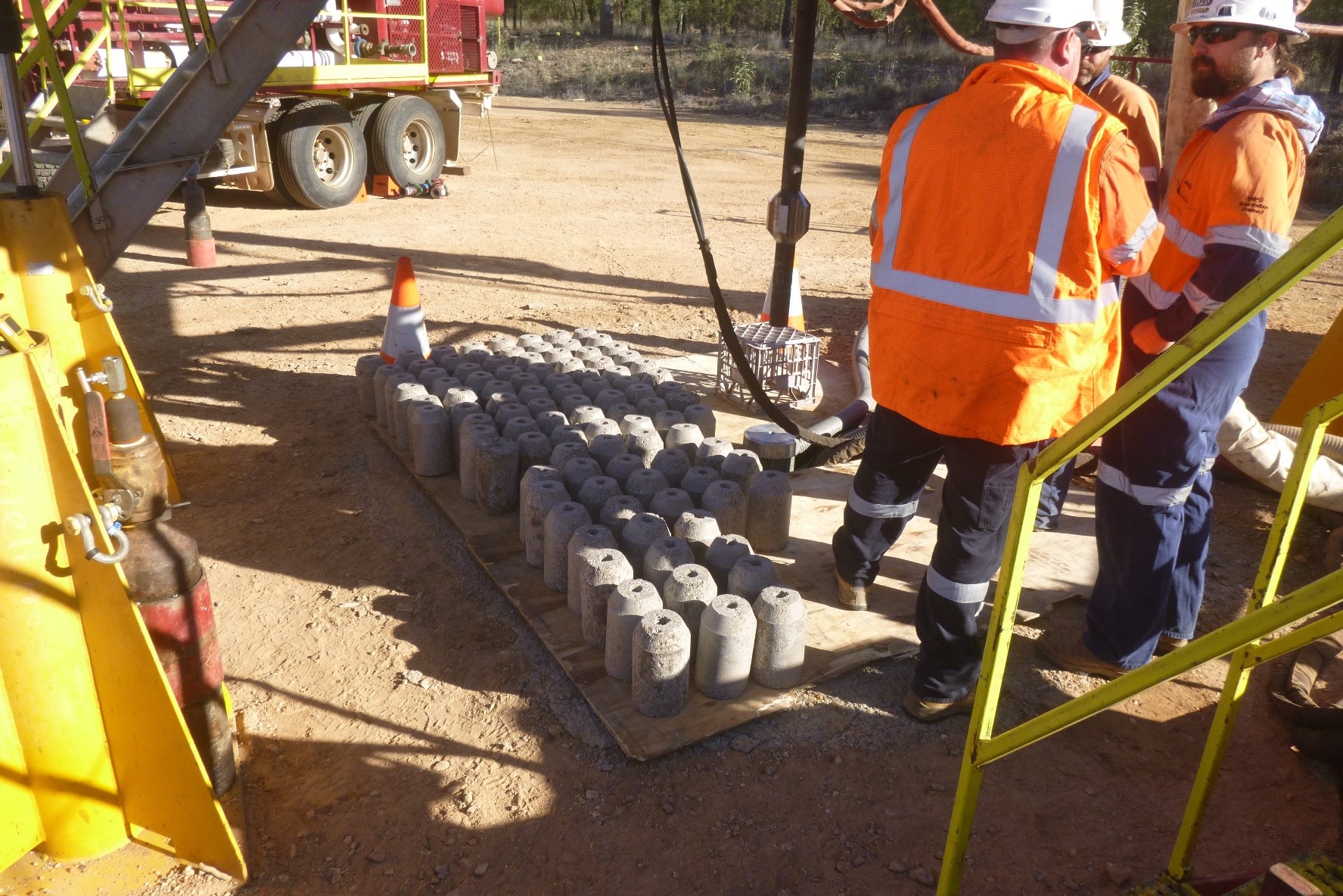
- Initial testing showed it actually increased in sealing performance during the healing process.
Advanced well plugging and abandonment
A new plug made out of a common clay is showing potential as an effective and permanent seal of bores, providing an alternative to the cement-based plugs used currently. The project has developed and trialled an innovative new environmental technology which could further improve the way unused coal, mineral, oil and gas wells and water bores are sealed off.
A specially engineered bentonite plug is showing potential as an effective and permanent seal of bores, providing an alternative to the cement-based plugs used currently. Bentonite is a fairly common form of clay which can be sourced locally in Queensland.
An extensive research and laboratory testing program worked on optimising the composition and shape of the plug to maximise performance.
The plug has now been trialled to test if the technology can improve the way unused bores are sealed off.
RESEARCH COLLABORATION
The plug’s development is the result of ground-breaking research made possible by a large collaborative partnership which bought together a broad collaboration of government, industry and technical specialists to work on the novel technology.
The research effort was led by The University of Queensland Centre for Coal Seam Gas, a university-industry partnership between The University of Queensland, APLNG, Arrow Energy and Santos. Former Centre member Shell/QGC also supported this project. Industry partners contribute funding to the Centre for multi-party research in optimising coal seam gas. This project also attracted vital backing of an Advance Queensland Innovation Partnership grant.
The plug has now been trialled thanks to a proactive partnership between the Queensland Government Department of Natural Resources, Mines and Energy (DNRME), The University of Queensland Centre for Coal Seam Gas and private companies Nautec and Renviro. DNRME managed the field operation with Dynamic Drilling (Aust) Pty Ltd providing drilling services.
SUCCESSFUL TRIAL
The trial was conducted at an old coal exploration borehole just out of Chinchilla. The bore had been marked for sealing due to higher than expected methane levels recorded at the surface, making it ideal site for the trial. It was the plug’s second run in the field, following on from a successful initial trial at a water monitoring well near the Shell/QGC’s Bellevue coal seam gas field near Miles, Queensland in 2016.
The trial used approximately 500 plugs (each 19cm in length) to seal the coal exploration hole. It involved re-drilling the coal borehole to its full depth of approximately 114 metres and filling it with the bentonite and a gas-tight impermeable grout.
It was the first time the plugs had been used in combination with the special grout formulated by Nautec. The grout has been specially designed to flow into small cavities and cracks in rock formations and provide a gas-tight seal. It was mixed on site by Renviro.
OUTCOMES & NEXT STEPS
Initial testing showed it actually increased in sealing performance during the healing process.
While ultimately, we would like more field trials to cover many potential uses, this trial has proved an excellent start.
MORE INFORMATION
The site of the trial was a coal bore adjacent to Greenswamp Road (about 15 kilometres south-west of Chinchilla).
The project site is being managed under the Queensland Government’s Department of Natural Resources, Mines and Energy’s, under its Abandoned Mine Lands Program, which assesses abandoned and legacy mine sites and reduces significant public health and safety risks.
The project was run in two main phases:
Phase 1: This project involved research aimed at a cheaper and more effective method to plug and abandon coal seam gas wells and other oil and gas wells. Currently coal seam gas wells and all oil and gas wells are required to be plugged with cement. But this process has limitations because cement is expensive and can require maintenance over time. This research investigated the use of a naturally occurring clay called bentonite to plug the wells. Bentonite is cheaper and easier to handle and when hydrated it creates a more reliable plug because it is malleable and self-healing when disturbed. Considerable lab data had already been acquired at University of Wyoming verifying the efficacy of the process and information from multiple field trials with bentonite plugging in the USA and at least one in Australia had been sourced.
The project included an investigation of the properties of bentonite and other clay supplies in Queensland, development of equipment to compress the dry clays into cylindrical shapes, suitable for plugging wells, and lab work designed to demonstrate the plugging ability of bentonite under various conditions. The research included:
- Assessment of properties of bentonite and other clays in Queensland and their availability
- Development of equipment to produce bentonite plugs suited to well plugging applications
- Report on performance characteristics as determined by laboratory testing program
- Recommendations to the regulator (Department of Natural Resources & Mines) regarding the use of bentonite as an alternate well plugging material.
Phase 2: Further research and field testing to provide clear scientific evidence of the performance of bentonite plugs under Australian conditions.
PROJECT OUTPUTS
- Article: Innovative bore sealing technology trialled in Queensland (2019)
- Article: Department of Natural Resources, Mines and Energy update (2019)
- Publication: Hydraulic testing of compacted bentonite used for plug and abandonment operations (2019)
- Publication: Small angle neutron scattering investigation of compressed bentonite plugs (2019)
- Publication: Characterisation geomechanical properties bentonite clay used for plug & abandonment operations of CSG wells (2018)
- Research poster: Centre Research Review (2018)
- Mphil thesis: Plugging coal seam gas wells with bentonite (2017)
- Final report : Bentonite Abandonment Plugs - Final Report Advanced Queensland Innovation Partnership (AQIP) project (2019)
- Research poster: Centre Research Review (2016)
- Publication: Towler, B.F., Firouzi, M., Mortezapour, A., Hywel-Evans, P.D. (2015) Plugging CSG Wells with Bentonite: Review and Preliminary Lab Results, SPE Asia Pacific Unconventional Resources Conference and Exhibition, Brisbane, 9-11 November, 2015. SPE-176987
- Research poster: Centre Research Review (2015)
|
